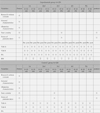Abstract
Purpose
The purpose of this study was to identify the effect of relaxation therapy on state anxiety, preterm labor stress, blood pressure, skin temperature, pulse rate of pregnant women with preterm labor and heart rate of their babies.
Methods
The participants were 55 pregnant women with preterm labor who hospitalized from May, 2009 to January, 2010. 29 participants were assigned to experimental group and the other 26 participants to control group. All of them were not have any other complications except preterm labor. The relaxation therapy was applied to the experimental group for 5 days. Data were analyzed by the SPSS/WIN 14.0 program.
Results
The state anxiety score and the preterm labor stress score of experimental group were statistically significant lower than those of control group. In addition, the systolic and diastolic blood pressure, pulse rate of experimental group were statistically lower than those of control group. The skin temperature of experimental group was higher than that of control group. However, the fetal heart rate of experimental group was not statistically significant lower than fetal heart rate of control group.
Figures and Tables
References
1. Alder J., Fink N., Bitzer J., Hosli I., Holzgreve W. Depression and anxiety during pregnancy; A risk factor for obstetric, fetal and neonatal outcome? A critical review of the literature. Journal of Maternal Fetal and Neonatal Medicine. 2007. 20(3):189–209.
2. An J.D. The effect of Taekwondo players' stress decrease on abdominal breathing and meditation program. Journal of Korean Society for the Study of Physical Education. 2004. 8(2):172–187.
3. An S.E. Effects of abdominal breathing on anxiety and labor time in primipara women. Korean Journal of Women Health Nursing. 2008. 14(3):196–204.
4. Astin J.A., Shapiro S.L., Eisenberg D.M., Forys K.L. Mind-body medicine: State of the science, implications for practice. Journal of the American Board of Family Practice. 2003. 16(2):131–147.
5. Benson H., Beary J.F., Carol M.P. The relaxation response. Psychiatry. 1974. 37:37–46.
6. Chang S.B., Kim H.S., Ko Y.H., Bae C.H., An S.E. Effects of abdominal breathing on anxiety, blood pressure, peripheral skin temperature and saturation oxygen of pregnant women in preterm labor. Korean Journal of Women Health Nursing. 2009. 15(1):32–43.
7. Chang S.B., Park H.J., Bae C.H., Shim J.O. The effects of abdominal breathing on preterm labor anxiety and frequency of uterine contraction. Clinical Nursing Research. 2007. 13(3):31–41.
8. Cunningham F.G., Leveno K.J., Bloom S., Hauth J.C. Williams obstetrics. 2009. 23rd ed. New York: McGraw-Hill.
9. Gennaro S., Hennessy M.D. Psychological and physiological stress: Impact on preterm birth. Journal of Obstetric, Gynecologic, and Neonatal Nursing. 2003. 32(5):668–675.
10. Gift A.G. Visual analog scales: Measurement of subjective phenomena. Nursing Research. 1989. 38:286–288.
11. Han C.J., Jun H.Y. The effect of foot reflexology on stress decrease in Korean middle-aged women. Korean Journal of Aesthetics and Cosmetics Society. 2009. 7(4):37–45.
12. Jacobson J.E. Progressive relaxation. 1974. 3rd ed. Chicago: The University of Chicago press.
13. Kim H.K. Stress and copying style of women with preterm labor. 2003. Seoul: Seoul National University;Unpublished master's thesis.
14. Kim J.T., Shin D.K. A study based on the standardization of the STAI for Korea. New Medical Journal. 1978. 21(11):1220–1223.
15. Kim J.Y. The effect of imagery-centered music listening on relaxation of women with high-risk pregnancy. 2010. Seoul: Ewha Womans University;Unpublished master's thesis.
16. Kim K.H., Jeon K.K. Stress coping and effect of college student. Korean Journal of Stress Research. 1994. 2(2):229–237.
17. Kim K.S., Lee S.W., Choe M.A., Yi M.S., Choi S., Kwon S.H. Effects of abdominal breathing training using biofeedback on stress, immune response and quality of life in patients with a mastectomy for breast cancer. Journal of Korean Academy of Nursing. 2005. 35(7):1295–1303.
18. Kim M.K., Lee Y.W., Cho I.S., Lim J.Y. Change of stress and nursing needs after hospitalization in preterm labor women. Korean Journal of Women Health Nursing. 2009. 15(1):24–31.
19. Kim M.O. The effect of a mind-body therapeutic program for infertile women repeating IVF treatment on uncertainty, anxiety, and implantation rate. 2008. Seoul: Yonsei University;Unpublished master's thesis.
20. Kwak E.J. The effects of pre-delivery music therapy program on the reduction of anxiety and stress of the primigravidas. Korean Journal of Music Therapy. 2006. 8(2):1–21.
21. Lee K.H., Lee Y.S. Maternity and women's health nursing. 2010. Seoul: Hyunmoonsa.
22. Moon D.H. The comparative study with fatigue, anxiety and stress between full-term and preterm pregnancy. 2006. Gwangju: Chonnam National University;Unpublished master's thesis.
23. Oh J. Effects of providing information on stress and maternal role confidence of women with preterm labor. Korean Parent-Child Health Journal. 2007. 10(2):99–109.
24. Park J.S. A study on Korean imaginations of relaxation. The Journal of Nurses Academic Society. 1993. 23(1):29–41.
25. Payne R. How to use instant relaxation methods. Nursing Standard. 1995. 10:23–25.
26. Ryu K.H., Shin H.S. Phenomenological study on experience of preterm labor. Korean Journal of Women Health Nursing. 2009. 15(2):140–149.
27. Shim J.O. The effects of abdominal breathing on preterm labor anxiety. 2005. Seoul: Yonsei University;Unpublished master's thesis.
28. Shin J.C. Recent trends in management of preterm labor. Korean Journal of Obstetrics and Gynecology. 2006. 49(7):1403–1409.
29. Susan S.R. Maternity, newborn, and women's health nursing. 2009. 2nd ed. Philadelphia: Lippincott Williams & Wilkins.
30. Yu W.J., Song J.E. The effect of abdominal breathing on state anxiety, stress, and tocolytic dosage of pregnant women with preterm labor. Journal of Korean Academy of Nursing. 2010. 40(3):442–452.




 PDF
PDF ePub
ePub Citation
Citation Print
Print






 XML Download
XML Download